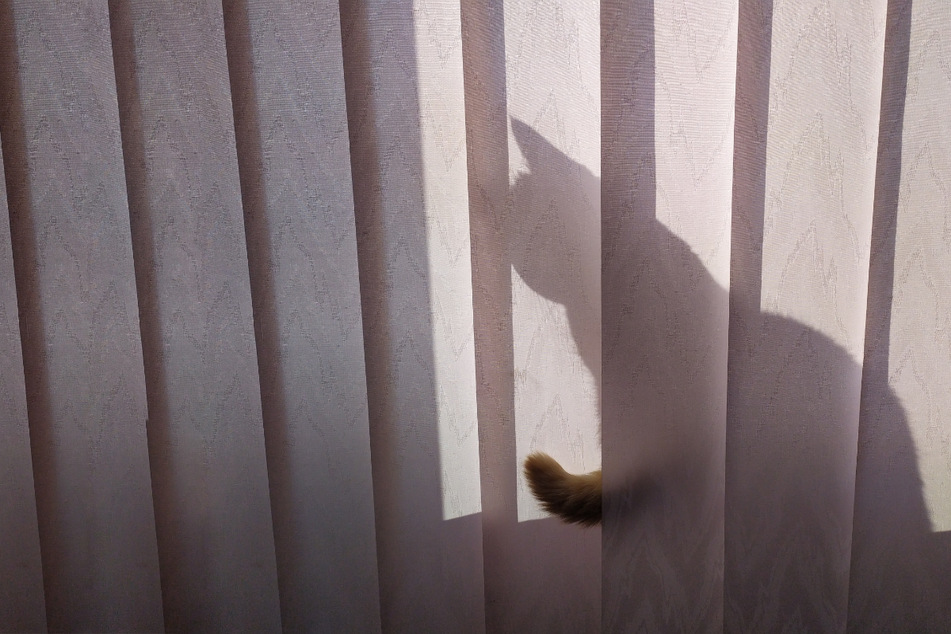Why is my cat hiding? How to lure a cat out from its hiding place
Has your cat been hiding lately? There are a variety of reasons behind why cats hide, and a variety of strategies to get them out of their shells. Here are some tips and tricks.

It's true that cats are far less sociable than dogs, but that doesn't make it normal for them to avoid their humans.
All cats, though, like to hide sometimes. It's an odd habit, and often coupled with playfulness, but what's behind it? Why does your cat keep lurking behind the blinds? Is it simply playing games?
In this cat guide, TAG24 dives into why cats hide, taking a look at the various reasons behind this odd behavior, and revealing how to lure a cat out of hiding and help it feel safe and sound.
Why is my cat hiding from me?
Cats are rather elusive fellows, slinking around in the shadows, and striking with their furry paws if they feel threatened or scared.
Every cat owner has been lightly slapped on the shin while making the bed or sneaking up on a cat, or surprised to see the cat emerge from behind the blinds after being missing for hours.
As such, many may have begun to wonder why their cat seems so intent on lying beneath the bed, concealed by darkness. What's with their habit of staying in boxes, or why do they like being behind the blinds? Interestingly, there are many reasons behind these behaviors.
While this is not an exhaustive list, here are five key reasons why your cat might be hiding from you.
Loud noises and crowds make cats hide
Imagine this: the doorbell rings, friends come in for dinner, music plays, and laughter melts through the walls and into the ears of your kitty. There's a reason behind the saying "scaredy-cat", and it's pretty simple: cats are remarkably easy to alarm!
In fact, loud noises and unknown people are two things surely guaranteed to scare your cat into hiding. They don't like unfamiliar situations, and they have incredibly powerful and sensitive ears, so if there's more hustle and bustle than usual, your cat's anxiety will rise.
Cats hide under the bed for sanctuary
Have you noticed that your cat hides beneath the bed or inside of cupboards even during the most tranquil of times? Well, it could be that they are not hiding, but merely hanging out in a space that is safe, familiar, and comfortable. Your cat could just be napping!
A cat sleeps an average of 16 hours every single day, and that's in addition to time resting and sitting with their eyes closed. They will often change their sleeping spots and enter smaller hidden nooks and crannies, perhaps beneath the bed or behind the curtains, simply because they feel safe and comfortable there. In other words, it's not necessarily hiding, but more convening in a contained space to feel comfy.

Cat hiding due to territorial bullying
Cats often have local rivalries with other kitties in the neighborhood vying for territory. While this is most common in outdoors cats, who will fight over food scraps or land, indoor cats may also fight over and bully one another.
When introducing a second cat into your home, it's always important to make it clear that they both own the space, or alternatively set very strict boundaries. Kitty quarrels can get violent, but often indoor cats will eventually settle down and, instead, one of the two will hide out of fear of their brother or sister.
Such issues can come hand in hand with cat anxiety and unhappiness. It is important to get these behaviors looked at by a veterinarian and seek advice on how to make your furry felines friends.
Scared cats will hide after moving
There are few things more frightening to cats than moving their homes, and whether you move either their sleeping spot or your entire home, it will almost certainly make them hide.
When you move to a different residence, it is a huge change in territory for a pet. There are new smells, different layouts to get used to, and many of your cat's rituals, like where they eat or where their litter box is, will be thrown off.
We all know that cats, especially males, are emotionally bound to their territory, and often fight over it. Upon reaching a new home, it can take months for normalcy to return. You need to allow your pet time to understand and feel safe indoors before even thinking about letting them outdoors.
Cat hiding and not eating due to pain
One of the more serious reasons why your cat might be hiding is due to pain caused by injury or illness. Various symptoms of sickness and injury can scare cats and, and seeing as they don't understand what is happening to them, will cause them to hide and withdraw.
If you notice a sudden change in your cat's behavior, this could be a strong indication that it is unwell. In the case that your cat is suddenly resting and protecting itself against humans in an unusual way, it could be sick and scared, so it's a good idea to get them checked by the vet - especially if they are crying frequently or making more noise than usual.
How to get a cat out of hiding

No matter the reasoning behind your cat's elusive behavior, there are always things that you can do to coax them out of hiding. It doesn't quite matter whether they have made their humble abode the inside of an empty box, or the couch's underside, love – and persistence – will always find a way.
The key to being a good cat owner is compassion. Indeed, your cat might be behaving peculiarly, but remember that they think differently to humans. If your cat behaves in a way that concerns you, the vet should be your first call!
Let's dive into five different ways to lure a cat out of hiding safely. How do you get a cat to come out? Here are some ideas.
Coax a cat out of hiding with a quiet space
One of the most important things to understand about a cat that has taken to hiding is that it could be scared. If that is the case, then coaxing them out and forcing them to be away from where they feel safe and secure would be cruel and counter-productive.
If the hustle and bustle has gotten to your cat, and it is hiding, for example, it is best to close the door of whatever room it is in, and coax it out only once people have left and the noise has died down. Your cat will make its own decision, though, so provide it with peace and quiet, and allow it to do what it will.
Important: Luring cats out of spaces where they feel safe and secure is not such a great idea. If they are safe and a bit scared, leave them be and check on them from time to time.
Offer a retreat to lure a cat out of hiding
If your cat has been hiding a lot recently, it might be time to revamp its sleeping spots. You want to provide plenty of comfortable, slightly hidden spots for sleeping (if you are curious about how to do this, here's a guide on where cats should sleep) because, if you don't, they will find their own spots and "hide" there.
So, what can you do? Cat owners should make sure that their cat has its own sleeping space that is quiet, calm, comfortable, and familiar. This place should not be troubled by guests or scary circumstances, and great care should be made to keep it secret and safe.
Prevent cat bullying to stop hiding
If your cat is being bullied by another animal house-member, or an unknown outdoor furry friend, there isn't a huge amount that you can do. To address this issue properly, let's split this answer into those two categories.
In the case that the bullying is happening inside, observe your pets together and ask yourself a few questions: Why do they fight? Are there enough food bowls, litter boxes, and sleeping areas? Does one pet get more exercise than the other? Are there personality differences?
Alternatively, if you have an outside cat that is struggling, you should take a look at when these fights may be occurring. In most cases it is best to stop animals from being outside after dark, and it is also good to try and identify your cat's enemy, so that if it's another feline, you can consult with its owner.
Give time and offer comfort to get a scared cat out of hiding

After moving homes, or changing environments, your cat may be quite scared.
It's no surprise, as moving one of the most stressful things to do even for humans, and it's likely even worse for a clueless feline.
The most important thing, though, is to make things as familiar as humanly possible.
You should adorn your new home with familiar items and smells to help draw your cat out of hiding. These can include:
- Food bowls
- Litter boxes
- Toys
- Sleeping place (preferably the same cat bed, pillows, or human beds that it was used to in the previous spot)
- Furniture and mats
Pro-Tip: If at all possible, these items should be distributed as similarly as possible to how they were in the cat's previous home. By doing this, you are limiting the amount of change that your cat has to deal with, which can assist with the anxiety that causes it to hide.
Always gently lure a cat out of hiding
Whatever you do, if your cat is hiding, you need to be gentle, patient, calm, and kind. It could be injured or sick, but it's more likely to be scared or anxious. In some cases it is just being playful, so you should never scare it or act in an unfriendly way.
If you are worried about your cat's health and need to take it to the vet, though, things can get a bit difficult. Here's how to lure it out of its hiding place:
- Try to lure your cat out of hiding by providing food and water.
- Put on some thick gloves if you need to go in and get your cat. You don't want to get hurt, but if you are worried about its health, managing a vet visit is extremely important.
- Always stay calm and patient, make sure not to hurt your cat, especially when transporting it in a carrier
- Call the vet before you visit, explaining the situation and seeking preliminary advice.
- If you're having trouble, call a mobile veterinarian and have them attend your house, so that you don't have to drag your cat out of hiding.
A visit to the vet will get to the bottom of whatever issue you are facing and is always the optimal option. Don't be afraid of taking your kitty, it's always better to be safe than to be sorry.
Cats need rest and retreats if you want them to stop hiding
The ultimate takeaway is that your cat needs to be treated with love, respect, and understanding. Provide plenty of places for it to hide, make sure that it has food and water, and show it as much affection as you can while not overwhelming it.
There are a vast assortment of reasons why your cat might hide at times, and it is not always necessary to coax it out. Just talk to it calmly and lovingly, and when you can, give it a loving pat!
Cover photo: 123RF / Vsviridova



